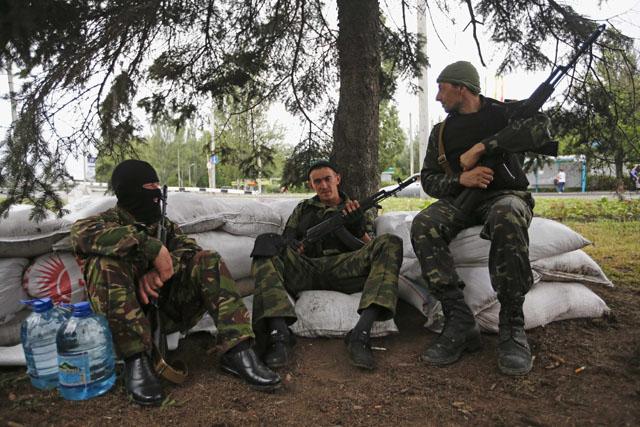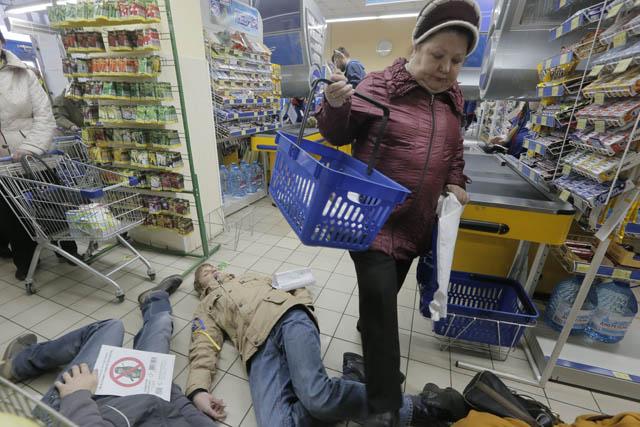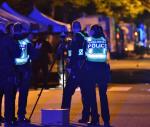You are here
Ukraine blames Russian agents for Kiev carnage
By AFP - Apr 03,2014 - Last updated at Apr 03,2014
KIEV — Ukraine’s Western-backed leaders on Thursday blamed Russian agents and the country’s ousted president of organising two days of bloodshed in February that claimed nearly 90 lives.
The explosive allegations were levelled only moments before Russia responded to the new course taken by its ex-Soviet neighbour by hiking the price it must pay for gas shipments to what Ukrainian officials say is the highest rate for any European state.
Moscow also lashed out at its old Cold War nemesis NATO for building up the defences of ex-Communist and Soviet nations that have felt threatened by Russia’s recent annexation of Crimea and massive buildup of forces near Ukraine.
The furious East-West battle for Ukraine’s future has exposed the deep divide that splits the nation of 46 million between those who see themselves as either culturally tied to Russia or a part of a broader Europe.
Those tensions exploded on February 18 when gunshots in the heart of snow-swept Kiev heralded the onset of pitch battles between riot police and protesters — some armed with nothing more than metal shields — that left scores dead.
Both sides have blamed the other for starting the violence. But no formal probe results had been unveiled until acting Interior Minister Arsen Avakov presented his initial findings to reporters on Thursday.
Avakov’s conclusion was decisive and potentially devastating for the new leaders’ relations with Russian President Vladimir Putin.
The acting interior minister said that deposed president Viktor Yanukovych had issued the “criminal order” to fire at the protesters while agents from Russia’s Federal Security Service (FSB) helped him plan and carry out the assault.
“FSB agents took part in both the planning and execution of the so-called anti-terrorist operation,” Ukrainian Security Service head Valentyn Nalyvaichenko told the same press briefing.
An FSB spokesman told Russia’s state-run RIA Novosti news agency that Ukraine’s allegations were patently false. Russian Foreign Minister Sergei Lavrov for his part said “huge amounts of evidence” contradicted Kiev’s claims.
Yanukovych fled to Russia only days after the carnage and is now wanted in Kiev for allegedly ordering police to open fire against the crowds — a charge he denies but that is likely to keep him out of Ukraine for years to come.
“Former president Yanukovych will be prosecuted,” Ukrainian Prime Minister Arseniy Yatsenyuk told the BBC. “He is accused of mass murder and we will bring him to justice.”
The raging security crisis on the eastern edge of the European Union has been accompanied by months of economic pressure that Russia had poured on Ukraine in a seeming effort to force its leaders to reverse their Westward course.
Russia’s state energy giant Gazprom — long accused of being wielded by the Kremlin as a weapon against uncooperative neighbours — on Tuesday hiked the price it charges Ukraine for natural gas shipments on which its industries depend by 44 per cent.
The punitive but largely expected step eliminated a price discount that Putin had extended the old government in December in reward for its decision to reject closer EU ties.
But Ukraine saw the price it must pay for 1,000 cubic metres of gas jump by another $100 to $485.50 following a failed round of negotiations in Moscow with the chief executive of Russia’s state energy firm Gazprom.
Moscow argues that a $100 rebate it awarded Kiev in 2010 in return for its decision to extend a lease under which the Kremlin keeps its Black Sea Fleet in Crimea no longer applied because the peninsula was now a part of Russia.
Kiev has vowed to contest the new charge — a warning that threatens a repeat of the 2006 and 2009 halts in gas supplies to Ukraine that also affected many of Russia’s other European clients.
“This is an unacceptable price for Ukraine because it is a political price,” said Ukraine’s Energy Minister Yuriy Prodan.
Europe’s worst security crisis in decades appeared to be only gaining momentum after NATO boosted the air power of Eastern European nations that Putin still views as part of Russia’s strategic domain.
The 28-nation bloc has said firmly it did not intend to get militarily involved in Ukraine no matter what Russia did.
But the alliance has vowed to review both its immediate strategy and historic mission after conceding that a Russian strike against Ukraine — a non-NATO member with an ill-equiped and underfunded army — could be both decisive and quick.
Related Articles
Pro-Moscow protesters in eastern Ukraine seized arms in one city and declared a separatist republic in another, in moves Kiev described on Monday as part of a Russian-orchestrated plan to justify an invasion to dismember the country.
Ukraine’s new pro-Western leader enters a defining week Sunday seeking to head off a Russian gas cut and secure US President Barack Obama’s backing with his country threatened by civil war.
Ukraine on Saturday rejected Russia’s latest gas price hike and threatened to take its energy-rich neighbour to arbitration court over a dispute that could imperil deliveries to western Europe.



















